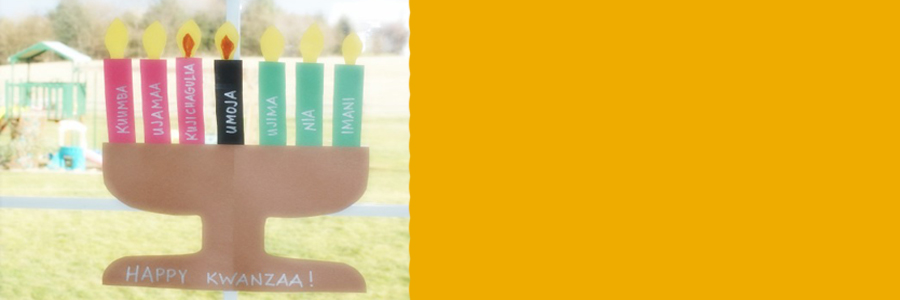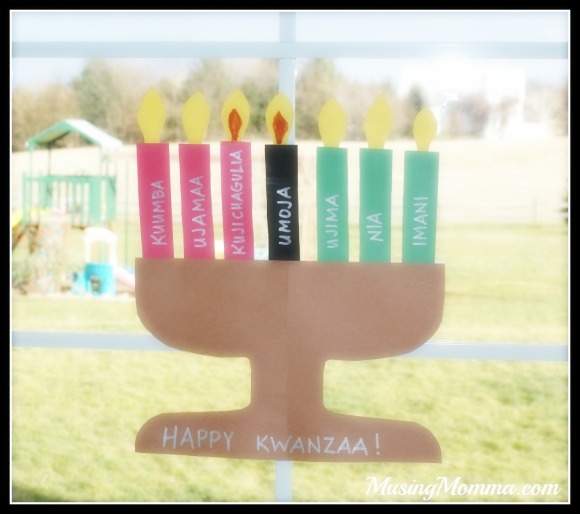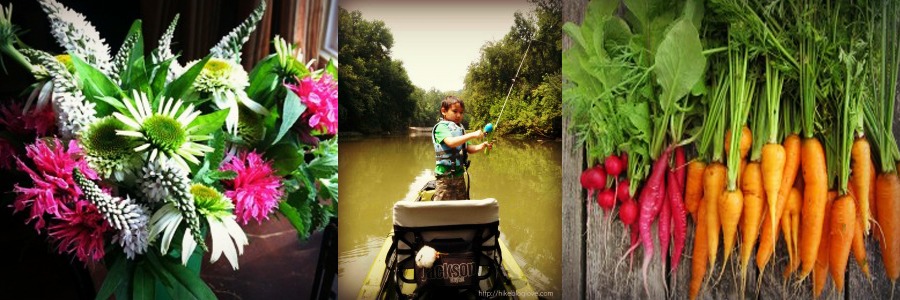Kwanzaa by Ellie of Musing Momma

Kwanzaa
~:: Musing Momma ::~
![]() Our family began celebrating Kwanzaa after our first son was born. We don’t observe Kwanzaa with the same intensity and furor that we embrace Christmas, but it has become one of our family traditions over the past few years. And it ends up that there is a lot about this holiday – which I took on in hopes of connecting my two boys to their African heritage – that speaks to me. Kwanzaa is a value-oriented holiday that honors culture, community, and connection. And it is a cultural holiday that includes an element of reverence and spirituality while being inclusive of all religions. I admit I also get a kick out of the way eyebrows raise when my 6-year-old offers the Swahili greeting, “Habari gani?”
Our family began celebrating Kwanzaa after our first son was born. We don’t observe Kwanzaa with the same intensity and furor that we embrace Christmas, but it has become one of our family traditions over the past few years. And it ends up that there is a lot about this holiday – which I took on in hopes of connecting my two boys to their African heritage – that speaks to me. Kwanzaa is a value-oriented holiday that honors culture, community, and connection. And it is a cultural holiday that includes an element of reverence and spirituality while being inclusive of all religions. I admit I also get a kick out of the way eyebrows raise when my 6-year-old offers the Swahili greeting, “Habari gani?”
But let me begin with full disclosure: Everything I know about Kwanzaa I learned from children’s books and the internet. I also have to do a web search for the correct spelling every time I write “Kwanzaa” to remember where that extra “a” belongs. So clearly I am no expert here!
Kwanzaa begins the day after Christmas and is observed over the course of seven days, each of which focuses on a specific value rooted in African culture: Unity, Self-determination, Collective Work and Responsibility, Cooperative Economics, Purpose, Creativity, and Faith. These principles are often referred to in Swahili during Kwanzaa, so you’ll hear words like Umoja, Nia, and Imani.
I know that Kwanzaa is bigger and deeper than what I understand of it. But I think we can embrace new traditions and allow our understanding to evolve, without expecting ourselves to be experts or “do it all” from the very beginning. Bringing Kwanzaa into our home is one step toward my husband’s and my goal of helping our boys develop a sense of connection and pride in their heritage. We’re finding joy in celebrating in our own way and exploring this together.
<> Ideally, families decorate with cherished pieces of African art during Kwanzaa. But, well, we don’t have any (yet)! Our family still doesn’t even own a traditional Kwanzaa candle holder, called a kinara. So last year we made our own out of construction paper and taped it to our kitchen window. My oldest loved “lighting” a new candle each day. Each candle represents one of the seven principles of Kwanzaa.
<> We try to find ways to celebrate each of the seven principles, like having dinner at an African-American-owned restaurant to honor Ujamaa (Cooperative Economics) or making a list of each family member’s personal goals to honor Kujichagulia (Self-determination).
<> Traditionally, children receive a book, to show commitment to learning, and a heritage symbol, to show commitment to tradition, as Kwanzaa gifts. We give each of the boys new books on the last day of Kwanzaa.
<> Some years we’ve chosen a value and emphasized it throughout the year. For instance, one year we focused on “Collective Work and Responsibility” – Ujima. That is a great one with little kids, because it comes up every day as we’re trying to teach cooperation and encourage helping others.
Here are a few things we haven’t done yet, but hope to try this year in the spirit of expanding our observance of Kwanzaa. You don’t need to observe the seven days of Kwanzaa in order to try one of these ideas, which are great ways to introduce Kwanzaa and to learn about a different culture.
<> This not-so-crafty momma is hoping to step up her game this year and try a couple of Kwanzaa crafts. With a little discussion about what is being made and why, crafts are a great avenue for teaching kids about a holiday or a culture. There are a ton of ideas on-line and I pinned a few that look easy (because when it comes to crafts with kids, I only do easy!).
<> As a family, read books that share African folktales or reflect African culture.
<> Play a game that has origins in Africa, such as Mancala.
<> Cook an African-inspired dish on New Year’s Eve, which is also the 6th day of the Kwanzaa and traditionally celebrated with a feast (Karamu) shared with friends and family. We’re entertaining the idea of having a kid-friendly New Year’s Eve party at our house this year. If we do, I’m thinking we’ll try a Karamu-inspired theme with some traditional Kwanzaa dishes. I found a recipe for peanut and squash soup that is calling my name!
<> Attend a Kwanzaa celebration in your community. This is one of my goals this year, even if we have to travel a ways to find one. Many Kwanzaa celebrations involve music, dancing, and speakers, so it should be a great way to experience African culture more directly.
I’ve created a Kwanzaa board on Pinterest with some crafts and recipes, so I’ll be looking to that for ideas when Kwanzaa begins.
Exploring a new tradition can be overwhelming. I was certainly overwhelmed when we decided to introduce Kwanzaa to our home a few years ago. But baby steps are okay. There’s no one saying we must celebrate all or none, perfectly or not at all.
May you have a happy winter season and enjoy whatever holiday(s) you celebrate!
ABOUT ELLIE: She is a psychologist turned mom who muses about motherhood and marriage in a multiracial family at Musing Momma. She lives in the northeast with her exceptionally patient husband and their two adorable but very mischievous little boys.
Follow Ellie on Twitter & on Facebook.
CONTINUE READING IN THE FAMILY ROOM






